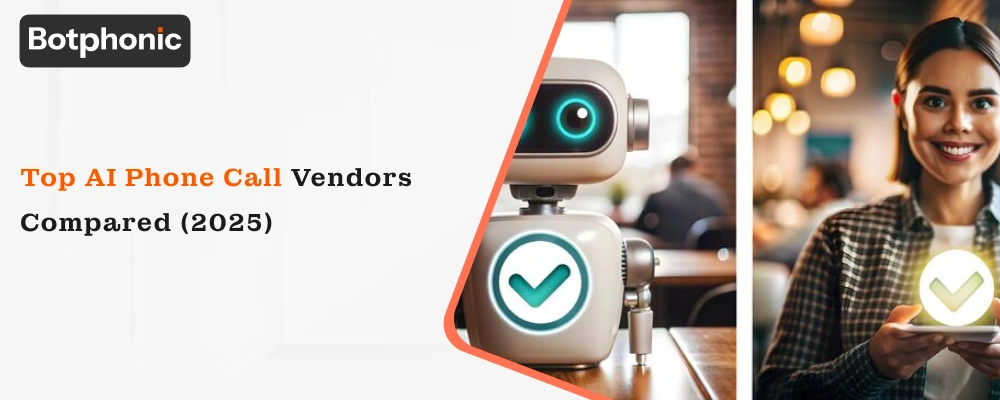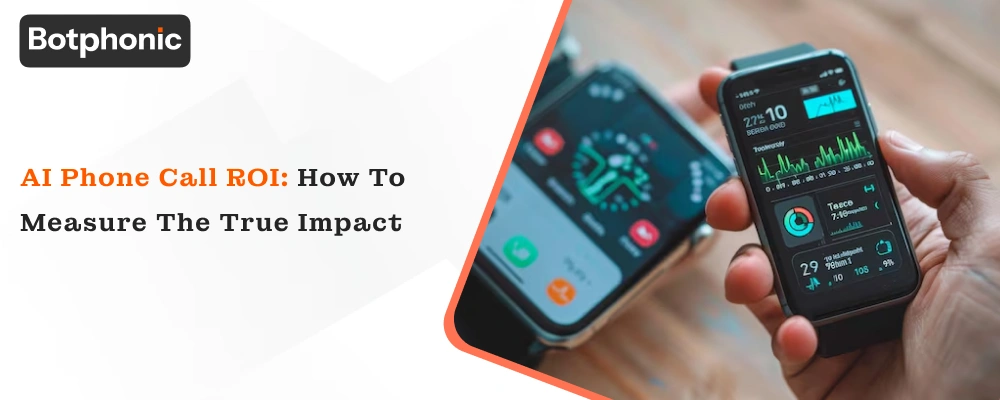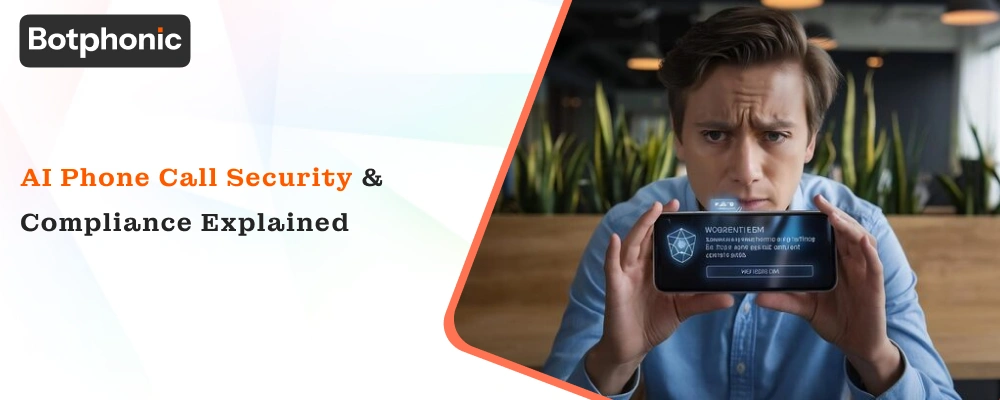
Summarize Content With:
Summary
This blog is all about a detailed comparison of top AI phone call vendors by 2025. You will first understand why it is so crucial to choose the right platform. After that, you will learn about the main players, how to assess them, and what steps to take next.
Key Takeaways
- The first piece of information to be discovered is what features can be used to evaluate AI phone call vendors.
- By reading this blog, you will understand how various vendors fare against each other on inbound vs outbound calls, voice quality, integrations and costs.
- Information about vendor Botphonic AI and the reasons that make it different from others in the field will be uncovered by you.
- With a quite straightforward decision framework, you will be able to choose the best vendor that fits your business in 2025.
Introduction
Just picture it if your firm is being called by dozens, maybe hundreds or even thousands of people every single day. A few of them might be new leads, others might be support issues, and some may be booking requests. Now, envision a scenario where you never fail to answer a call, your customers never get put on hold, and your team members can concentrate on the most valuable calls.
This is essentially what AI phone call systems promise. This blog compares AI phone call vendors for 2025, so you can select your partner wisely. We’ll work together to figure out what really matters, identify the best vendors, understand their differences, and use that information to make the right decision.
What “AI Phone Call Vendors Comparison” Really Means
Trying to find the best AI phone call comparison means that you want to compare companies that provide AI-powered voice/phone call services- inbound, outbound, sales, support, and bookings – and then evaluate their performance. We benchmark on technology (voice quality, latency, language support), use cases (lead qualification, appointment booking, customer support), integrations (CRM, calendar, analytics), price & scalability, and customer experience.
One market research shows that the total voicebot market size will be about $98.2 billion globally by 2027, with a CAGR of ~18.6% from 2022 to 2027.
Why Perform An AI Phone Call Vendor Comparison?
- Firstly, to avoid such an investment, which may result in a system generating robotic-sounding speech, struggling with different accents, and the conversation not flowing logically.
- Secondly, to make sure that the platform meets your needs, is it just inbound? Just outbound? Global calls? Several languages?
- Thirdly, to budget costs properly, it is essential to consider the variable costs, which include call volume, minutes, and integrations.
- Fourthly, to equip yourself with a vendor that is capable of scaling, integrating, providing analytics, and evolving so that you can keep up with the changes in operations in the future.
- Fifthly, to secure a vendor that is consistent with your brand voice, customer experience expectations, and workflow automation.
Top Vendors in 2025 for AI Phone Call Services

The first paragraph explains that the reader should consider various vendor systems that use AI voice call technology in 2025. The list doesn’t cover all existing systems; however, it does encompass those that are highly competitive and offer unique features.
1. Botphonic AI
Botphonic AI is a user-friendly platform with great potential that aims to bring about a significant change in the way businesses communicate over the phone. The platform comprises three key components: natural voices, intelligent automation, and in-depth analytics.
All these components together give companies a full command of both inbound and outbound calls. In a comparative analysis of different AI phone call vendors, Botphonic AI is a clear winner for several reasons, including its focus on real-time conversation quality, user-friendliness, and integration flexibility.
The platform allows you to:
- One can fully automate calls; that is, lead qualification, appointment scheduling, reminders, and customer support can be done with very little manual intervention.
- You have the option to select the voice of your brand from over 65 real-sounding voices in different languages and accents.
- Integrate with CRMs, calendars, and telephony systems seamlessly, ensuring every call aligns with your workflow.
- Utilize live analytics and reports to track call duration, response rates, and conversions to make informed decisions.
Additionally, calls are automatically recorded and transcribed, which helps conversation reviewing become less time-consuming and script improvement easier.
Human-like conversations with very short delay periods are what Botphonic AI’s technology guarantees. The customers are to such an extent that they do not realise they are talking to a machine.
Best for: Firms that need an all-in-one, multilingual AI voice assistant capable of call automation, analytics enhancement, and providing a natural, engaging caller experience.
Don’t let potential customers slip away just because you don’t pick up the phone or you take too long to return the call. By using Botphonic AI, customers will always receive a pleasant, human-like voice that answers immediately, schedules appointments, and qualifies leads in a flash.
Request a Free Demo2. Lindy
One of the top options for AI voice agents in 2025, Lindy is frequently mentioned in reviews.
Points of strength:
- No-code voice agent platform: can make and take real phone calls, carry on natural conversation, qualify leads, and update systems.
- Great for use in situations such as sales calls, recruiting, and client onboarding.
Weaknesses:
- If you want to create very complex workflows, you might have to upgrade to a paid plan.
- It may also be necessary to adjust your business processes so that they can match its pre-configured flows.
- Best for: Firms that require a rapid launch, minimal customisation, and AI-driven handling of both inbound and outbound calls.
3. Synthflow
Synthflow is referred to as a “volume champion” among voice AI vendors in 2025.
Points of strength:
- Designed to scale, it is capable of handling huge volumes of calls in different countries with various languages.
- Great for outbound campaigns and multilingual support.
Weaknesses:
- It might be necessary to pay special attention to the script and voice flow while tuning to ensure that the final product does not sound too generic.
- Best for: Companies that require large-scale outbound calling, multi-language support, and a high number of simultaneous calls.
4. eesel AI
Although eerily more text-focused, comparison articles position eesel AI as a distinct option (automation of support via channels other than voice).
Points of strength:
- Focus on integration with existing support tools for a faster launch.
Weaknesses:
- Not a purely voice vendor; may not handle rich outbound voice scenarios.
- Best for: Groups that want to automate support and supplemental calls rather than a full-scale voice agent rollout.
5. PolyAI
PolyAI is the one who is recognized as a highly human-like voice agent that can handle various languages and industries.
Strengths:
- Very good language support (e.g., 42 languages) and well-developed conversation flows.
Weaknesses:
- It could be on the higher end of the enterprise price range and complex.
- Best for: Worldwide corporates that have multi-lingual inbound voice requirements, need complex flows, and want high-quality outputs.
Why Botphonic AI Might Be Your Best Choice Right Now

- Since this blog promotes Botphonic, here are some compelling reasons, based on facts, why Botphonic AI is the best choice when comparing AI phone call vendors.
- It enables the automation of calls, both inbound and outbound, along with a rich voice library (65+ voices), allowing you to select and personalise your company’s brand voice.
- The main focus is on human-like conversation (voice tone, latency, and natural responses); therefore, the customer does not get the impression of speaking to a machine.
- It includes multilingual support and a large integration ecosystem (CRM, calendar, telephony, and analytics) to be compatible with your current workflow.
- The main focus is on analytics: besides call automation, you can also record, transcribe, and analyse calls to track conversion, drop-off, and lead quality.
- They offer a straightforward value proposition: reducing operational costs, automating routine calls, freeing your team for high-value work, increasing customer satisfaction, and retention.
Final Thoughts
Comparing AI phone call vendors or AI phone call software and deciding which one to choose should not only be about selecting the cheapest or most popular one. It involves a vendor matching your workflows, call volume, languages, CRM/telephony setup, and customer experience expectations, including voice quality, automation, analytics, and scalability.
The spectrum of use cases that emerge from the discussion about the vendors Lindy, Synthflow, PolyAI, and Botphonic AI encompasses rapid launch lead qualification, high-volume outbound, global multi-language inbound, and balanced inbound/outbound with strong integration, respectively. In case your company is seeking a feature-rich solution that is easy to launch and provides analytics, Botphonic AI would be an excellent option to consider.

